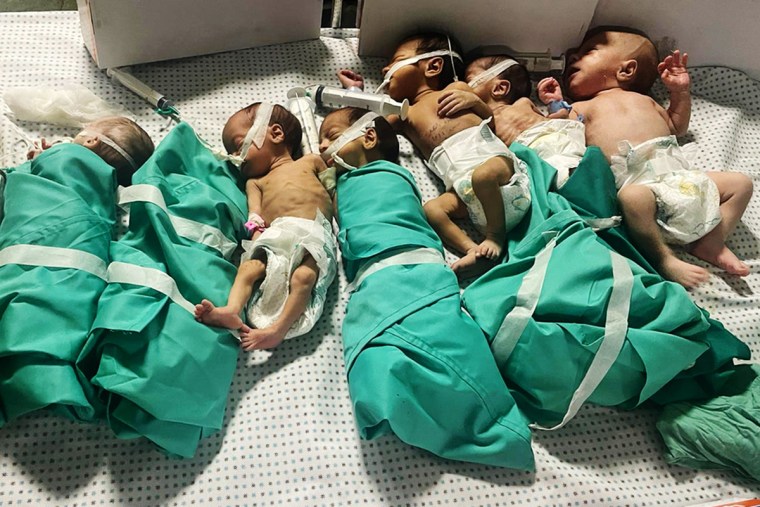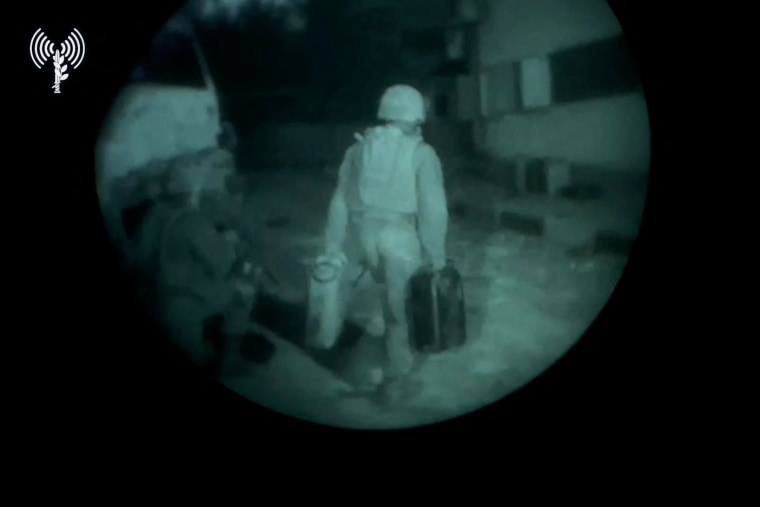As outrage grows over reports of babies dying and a mass grave being dug at Gaza’s Al-Shifa hospital, Israel has publicly indicated a desire to mitigate the crisis there — not by ending the siege but by offering fuel and mobile incubators.
On Sunday night, the Israel Defense Forces released footage appearing to show soldiers depositing 300 liters (about 79 gallons) of fuel at Al-Shifa’s entrance and announced an evacuation route for people in the complex to flee. On Monday came a pledge that the IDF would coordinate the delivery of incubators to Al-Shifa, following reports that premature babies there had to be removed from their incubators because of power shortages. Then on Tuesday, the IDF shared a photo of a female soldier helping load mobile incubators into a van, which an IDF spokesperson said would be used to transfer at-risk infants out of the hospital.
“We are trying to bring in incubators that can help transfer babies out of Shifa Hospital to other places down south, which will help safeguard the babies in the hospital,” IDF spokesman, Lt. Col. Peter Lerner, said.
The IDF said in a briefing later on Tuesday that the incubators had come from Israel’s Tel Hashomer Hospital and are “intended to be used to move premature babies to a safer space.” Asked how they will be delivered to Al-Shifa, spokesman Lt. Col. Amnon Shefler said coordination with the hospital “has not yet been completed.”
Dr. Ahmed El Mokhallalati, a plastic surgeon at Al-Shifa, said the hospital had not yet gotten a “proper offer” from the IDF to evacuate the babies.
Gaza’s hospitals, Al-Shifa in particular, have captured the world’s attention and become one of the war’s biggest and most contentious storylines as they run out of fuel and resources amid an overwhelming influx of patients injured by Israeli airstrikes. Israel has repeatedly alleged that Hamas hides in tunnels below Gaza hospitals, including under Al-Shifa — which both Hamas and hospital workers have denied. But images of vulnerable babies and desperate pleas from Al-Shifa’s medical staff for fuel to keep the hospital running have garnered intense public sympathy.
President Joe Biden said Monday he hoped and expected that there would be “less intrusive action relative to the hospital,” and that the hospital “must be protected.”
Israeli officials appear acutely aware that the world is watching in dismay.
“The IDF remains committed to upholding its moral and professional responsibilities to distinguish between civilians and Hamas terrorists,” the army said in a statement announcing the transfer of incubators.
However, doctors at Al-Shifa and spokesmen for the Palestinian Ministry of Health have highlighted what they see as inadequacies in Israel’s offers.
A spokesman for the ministry told Reuters on Tuesday that they do not object to having babies evacuated from Al-Shifa to a hospital in Egypt, West Bank or even Israel, but that there is no way to ensure that can happen safely amid the fighting. Israel has instituted daily, four-hour humanitarian pauses in the fighting in northern Gaza and urged residents to evacuate south, though southern Gaza has also faced significant bombardment.

The Red Cross, meanwhile, said it is in touch with both parties about Al-Shifa but that no concrete plans or decisions regarding a transfer of the newborns involving the organization have been made.
Failing an evacuation, it is not clear how the delivery of incubators would help save the lives of premature babies when Al-Shifa lacks electricity to power them — the reason they were removed from incubators in the first place.
NBC News was also unable to verify when the incubators might be delivered or how the Israeli army would get them to Al-Shifa amid the violence in the area, which hospital staff said left them afraid of venturing outside.
The promised evacuation route from the hospital, too, does not seem to have changed the situation — doctors at Al-Shifa on Monday said they were not aware of anyone leaving the hospital in the prior two days.
Dr. Nidal Abu Hadrus, a neurosurgeon at Al-Shifa, said on Monday that it was impossible for people to leave given the close sounds of bombing and shooting outside.
“It is not safe to move out. It is not safe to stay. We don’t know what to do,” he said.
Although many people were able to evacuate from Al-Shifa earlier in the conflict, fighting in the area has intensified since Friday, and the World Health Organization said 600 patients remained there on Monday. El Mokhallalati estimated the number as closer to 700, and said there are also 700 staff members there and 2,000 to 3,000 civilians taking shelter. Israel has denied that Al-Shifa is under siege.
As for the 300 liters of fuel Israel left at the hospital entrance, a doctor there said on Sunday that Al-Shifa staff had not retrieved it because the amount was virtually a drop in the bucket. At least 10,000 liters per day (2,640 gallons) would be needed to run vital parts of the hospital, according to Dr. Marwan Abusada, a surgeon at the hospital who is also the head of international cooperation at the health ministry.

The IDF alleged that Hamas had told hospital staff not to collect the fuel. It said Tuesday that the delivery was just meant to “gain more time” to save the lives of people in the hospital — specifically babies and children — and not run the entire hospital.
Al-Shifa was forced to bury its dead in a mass grave inside the complex on Tuesday, with around 180 bodies buried there, El Mokhallalati said.
The hospital’s director, Midhat Abbas, said the bodies had been starting to decompose.
The hospital has “turned into a real cemetery for the sick and wounded,” he said.
Yuliya Talmazan reported from London, and Chantal Da Silva from Tel Aviv.


